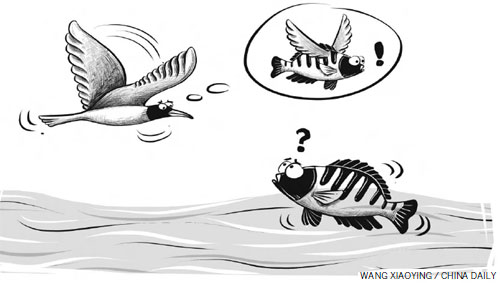China's democracy to prosperity
Updated: 2014-05-30 07:46
By Ren Jingjing(China Daily)
|
||||||||

Addressing College of Europe students during his state visit to Belgium in April, President Xi Jinping said: "In 1911, the revolution led by Sun Yat-sen overthrew the autocratic monarchy that had ruled China for several thousand years. But once the old system was gone, where China would go became the question. The Chinese people then started exploring long and hard for a path that would suit China's national conditions. They experimented with constitutional monarchy, imperial restoration, parliamentarism, multi-party system and presidential government, yet nothing really worked. Finally, China took the path of socialism."
This is a profound summary of China's historical and practical experience in the search for a development path that suits its national conditions. People's democracy is the life of socialism, and developing socialist democracy is the unswerving goal of the nation and the Communist Party of China. As an important component of comprehensive reform, political restructuring has been deepening in China along with economic and social development, and wider participation of people in politics.
Socialism with Chinese characteristics is a historical choice for China. Contrary to what some Western experts say, the Western-style democratic system does not have universality. Democracy as a part of the socio-political superstructure is closely linked with a certain economic base and a certain development level of productivity. As such, the democratic system is not a constant pattern. Western-style democracy may suit Western countries, but it is not necessarily applicable to all countries and regions.
Instead of opting for a so-called mature democratic model, a country should choose one that reflects its political, economic, social and cultural characteristics. As Xi once said, "only the wearer knows if the shoe fits his foot". The result of China's political exploration is that Western-style democracy will not help it realize national rejuvenation.
After the founding of the People's Republic of China, the CPC put democratic centralism into practice, mobilized social resources and transformed the country from a backward agricultural society into an industrial power within just a few decades. The fact that China has already become the world's second-largest economy proves that the political system it follows is in no way inferior to that followed by the West.
Western powers' attempt to impose their style of democracy on other countries is what led to the so-called Color Revolution in the Caucasus, the "Arab Spring" in the Middle East and the Ukraine crisis. The "democratic regimes" that the West helped establish failed to bring stability and prosperity to these countries, with some even falling into the abyss of civil war. It is because of the hypocrisy of Western-style democracy that the term "democratization" is losing its charisma across the world.

 Music at her fingers
Music at her fingers
 Across America Over the Week (Jan 16 - Jan 22)
Across America Over the Week (Jan 16 - Jan 22)
 Spend Chinese New Year in style
Spend Chinese New Year in style
 Ili river valley becomes a popular destination for swans
Ili river valley becomes a popular destination for swans
 Philip Ma: from scientist to businessman
Philip Ma: from scientist to businessman
 Birmingham's Spotlight on China dinner
Birmingham's Spotlight on China dinner
 How to distinguish doucai, wucai, Famille-rose and enamel porcelain
How to distinguish doucai, wucai, Famille-rose and enamel porcelain
 Xinjiang lake in bumper fishing season
Xinjiang lake in bumper fishing season
Most Viewed
Editor's Picks

|

|

|

|

|

|
Today's Top News
Houston's SW Chinatown
China to focus on reforms, opening of capital market
Slowdown brings new risks to banks
Trade group calls for BIT
Market status for China is 'political' issue
Birmingham's Spotlight on China dinner
Bank takes renminbi-clearing seriously
Traditional Garb
US Weekly

|

|








